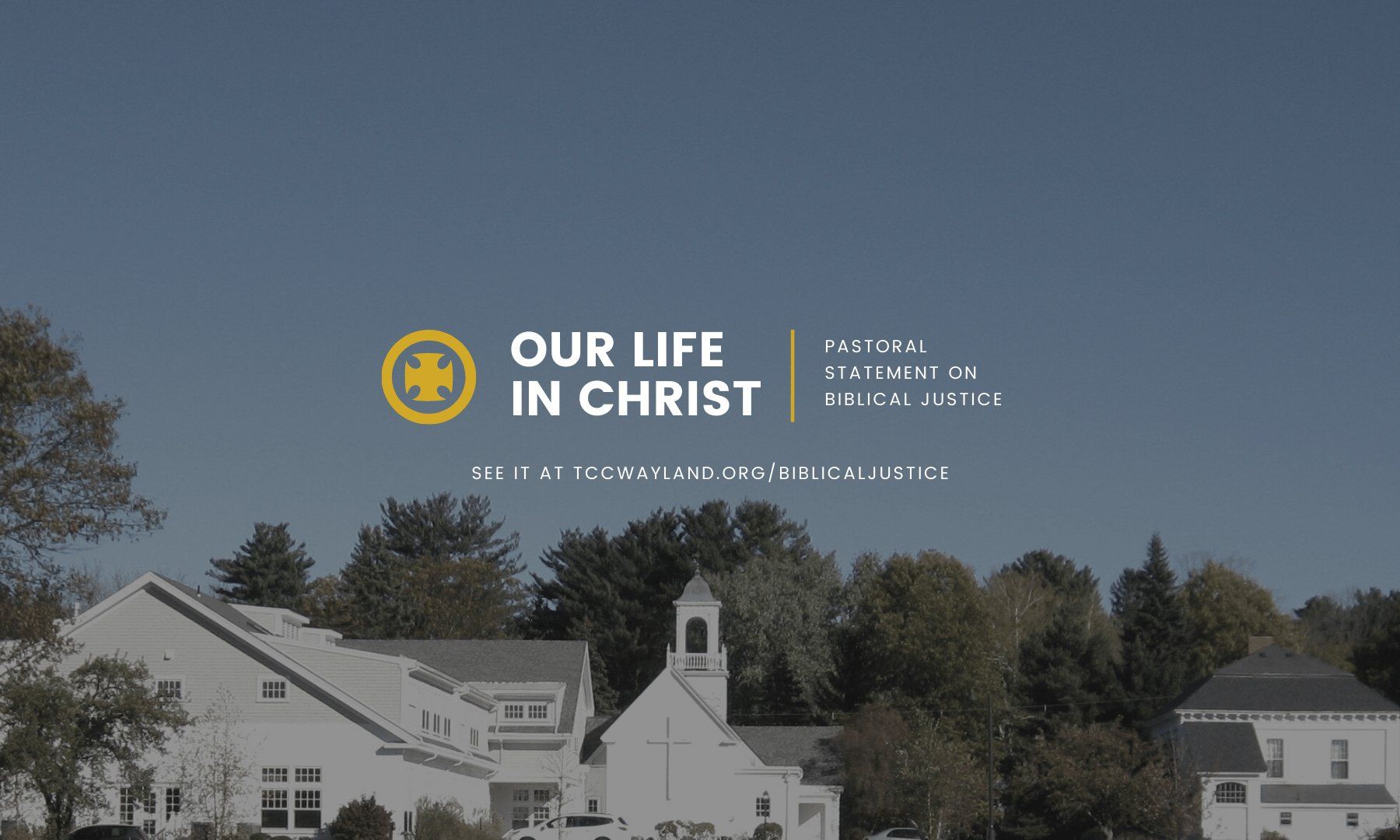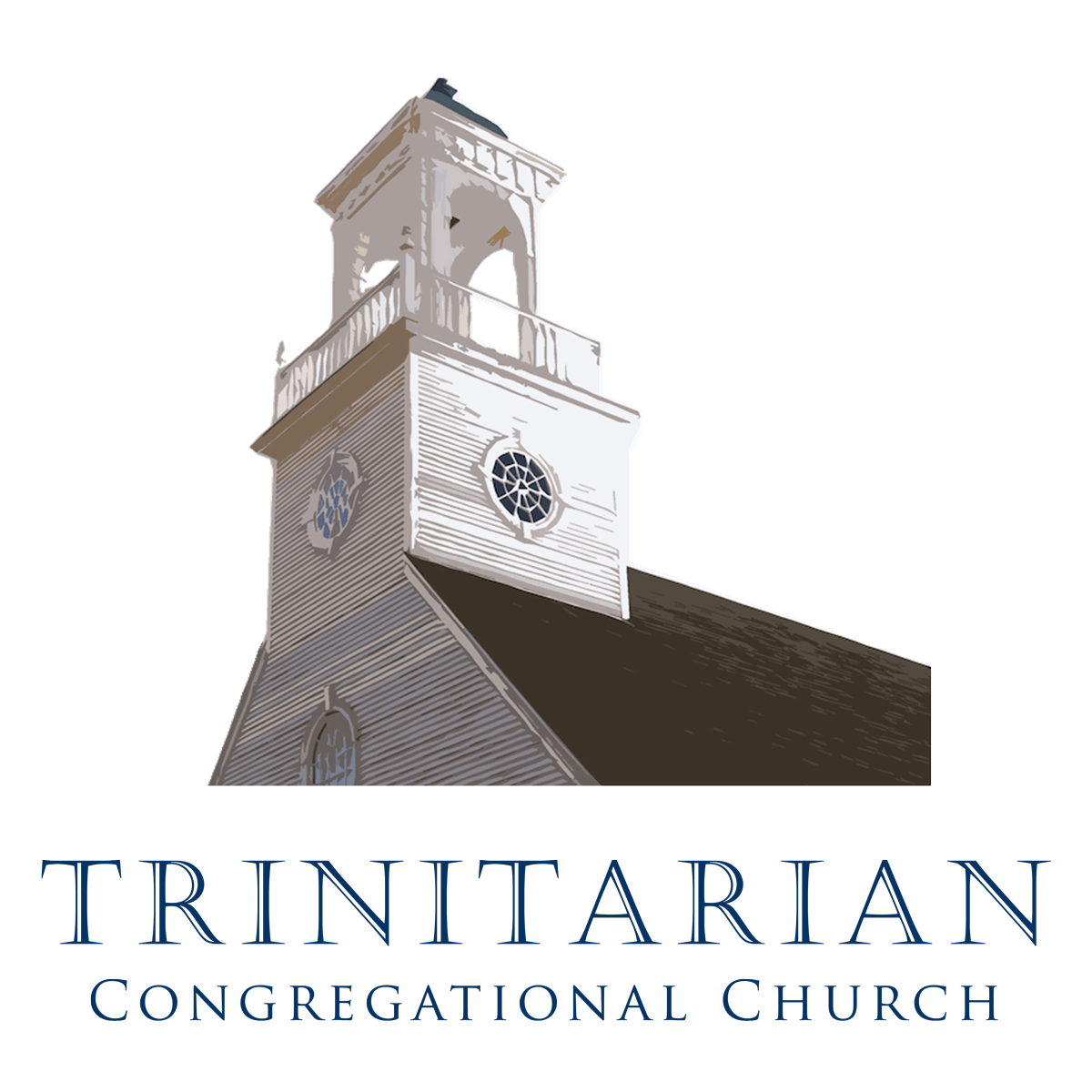Our Life in Christ
Our Life in Christ: Statement on Biblical Justice
Our Life in Christ:
Trinitarian Congregational Church Statement on Biblical Justice
Our Mission Statement: To be and make disciples of Jesus Christ. (Matthew 28:16-20)
Dear Church,
Since the summer of 2020, we as a pastoral staff, with full support from the Board, have been thinking, praying, and talking about what a faith-filled response might look like to the senseless acts of violence that continue to occur in our country as well as other nations. Our response to any tragedy, local or global, can and should initially be addressed in our regular worship services – we grieve with those who grieve and lament and cry out to God when violence happens and injustice prevails. This should always be the case, and no statement or document will replace the natural and immediate response of the local church worshiping together through grief and pain.
On the other hand, we also want to clearly articulate a theological perspective on Biblical justice that we might not have time for in a Sunday worship service. Such a framework roots and grounds our discussions on justice in scripture, and invites all to think more deeply about the various social and political positions we might take. While the document certainly does not supersede our bylaws, the historical creeds of the church, or our own statement of faith, we do hope that it will bring clarity to our discussion on social issues, and inspire further thought and discussion.
Rooted in the Gospel of Jesus Christ
We treasure the Gospel of Jesus Christ and pray that every person in this community would know God truly: Father, Son, and Holy Spirit (Romans 10:9-10; 2 Peter 3:9).
We celebrate the profound unity we share in Christ (Ephesians 4:3-6).
Called to Equip the Church
We believe that every faithful response to the sinful brokenness that we find in culture and society begins with a robust understanding of the Gospel and the right interpretation of Scripture within the Spirit-filled church (2 Timothy 3:16-17). We read Scripture in light of the Death and Resurrection of Christ (Luke 24:17).
Therefore, we aim to equip every person in this community with the knowledge and tools to understand and interpret the Word of God and apply truth contextually (2 Timothy 2:15; Ephesians 4:11-13).
The Necessity of Confession
We acknowledge the negative effects of the fall and presence of sin in the created realm and society (Romans 8:21; Revelation 13:1-18). Therefore, we embrace the individual process of confession and repentance for both intentional and unintentional sins (Psalm 51:1-5; Romans 7:21-23; Isaiah 1:16-20; Matthew 3:8). We recognize the corporate nature of sin patterns and confess those sins and repent of them accordingly (Nehemiah 1:6; Micah 3; Romans 3:23). We desire that our words, including political and social discourse, would magnify God both in their content and delivery. We reject hateful, accusatory, slanderous and divisive speech (Ephesians 4:15; 5:4; James 3:6; Galatians 5:20).
Compassion and Care for the Poor
We affirm that the call of the worldwide Church is to bring about the obedience that comes from faith in Jesus Christ (Romans 1:5). An implication of this obedience of faith is to engage in efforts to promote Biblical justice, righteousness, and peace around us (Micah 6:8; Romans 12:1-21). Biblical righteousness calls us to compassion and empathy for the defenseless and the powerless defined in the Law with the triad of sojourners, orphans, and widows (Deuteronomy 24:19; James 1:27; the story of Hagar, Genesis 16). We are called to apply these principles to other categories of people as well, such as the rights of the unborn (Exodus 21:22-23; Psalm 139:13-16).
God shows no partiality
One of the “litmus tests” of our living faith is how well we take care of the poor (Job 29:12; Amos 5:24; Proverbs 19:17; our zeal for good works, cf. Titus 3:14). Jesus affirms this priority throughout His ministry and His care and compassion for the poor (both defined in a physical and spiritual sense). Jesus reaches out to the “other” at every turn, while at the same time offering salvation to anyone, whether the powerful (Theophilus, a Roman Centurion, a member of the Sanhedrin, a corrupt rich tax collector like Zaccheus, etc.) or the powerless (Bartimeus) and the shunned (lepers, the woman with the flow of blood, etc.). God shows no partiality (Romans 2:11; Galatians 2:6; James 2:1-9).
Celebrating Our Diversity of Gifts and Perspectives
We need the diverse perspectives and gifts of this community in order to build one another up into maturity in Christ (Ephesians 4:11-13; Romans 12:4-8; 1 Corinthians 12). As we form a Biblical worldview on cultural and social issues (framed by biblical Law which is affirmed and fulfilled in the New Testament: Matthew 5:17-20; Romans 13:8-10), we may prioritize the responses to various issues differently (cf. Romans 14 and its principles of forbearance applied to the contemporary context). For instance, we recognize a variety of responses to societal concerns (creation care, economic flourishing, immigration policy, and so on). We reject judgmentalism that would come from our varying responses to past, current and future social issues. We resist any pseudo-Biblical worldview that minimizes the commandment to actively love God and love our neighbors (Matthew 22:35-40).
Created in God’s Image
Within this framework of diversity of responses, we affirm the boundaries of holiness as defined by God’s Word. We uphold the biblical definition of human identity and sexuality (Genesis 1:27; 1 Corinthians 6:9-11; 1 Thessalonians 4:3; 1 Peter 1:16). We affirm that God lovingly created all humans in His image as gendered beings, male and female. We believe that God designed marriage as a covenant relationship between one man and one woman (Genesis 2:24).
Called to be Peacemakers
We believe the answer to problems in our society begins with our peace (Hebrew: shalom) with God (Ephesians 2:4; cf. Leviticus 3:1). Shalom primarily belongs to the language of the sacrificial system and describes a restored relationship with God through Christ’s sacrificial and substitutionary death on the cross (Romans 5:1-11). The result of this restored peace with God is blessing and welfare in our lives from God and with one another, which is also translated as shalom (cf. Jeremiah 29:7). So shalom is a spiritual concept first and foremost (removal of the enmity between God and us as individuals). Communal peace among God’s people is an implication of our peace with God. The ideal of shalom in society is a third category. While peace with God by faith is a certainty and peace with one another as believers is a priority we are called to achieve, the goal of shalom/welfare in society in this present evil age will always have partial and uneven results. It’s truly a “now-and-not-yet” category but leaning heavily toward the “not-yet” (e.g., the cyclical nature of wars and strife around the world).
Seeking Peace With God and One Another
True shalom/welfare, including the establishment of justice in society will come in the New Heaven and New Earth (Isaiah 65:17-25), what Paul calls our “blessed hope” (Titus 2:13). So as we await the appearing of our great God and Savior Jesus Christ (Titus 2:11-14), and out of our own restored relationship with God, we actively engage in peacemaking with one another. Jesus says to be a peacemaker is a sign of our identity as sons [and daughters] of God (Matthew 5:9). “If possible, so far as it depends on you, live peaceably with all” (= the now-and-not-yet principle, Romans 12:18). As we receive forgiveness from God through Christ, we extend forgiveness to those who have wronged us. Colossians 3 sums up the principles, especially vs. 12-17: “bearing with one another;” “forgiving each other, as the Lord has forgiven you, so you also must forgive;” “Let the peace of Christ dwell in you richly.” We seek to be a church that welcomes all people to come through our doors and hear the good news of the Gospel. In this way, we pursue peace and shalom.
In Christ together,
The TCC Pastoral Leadership Team



